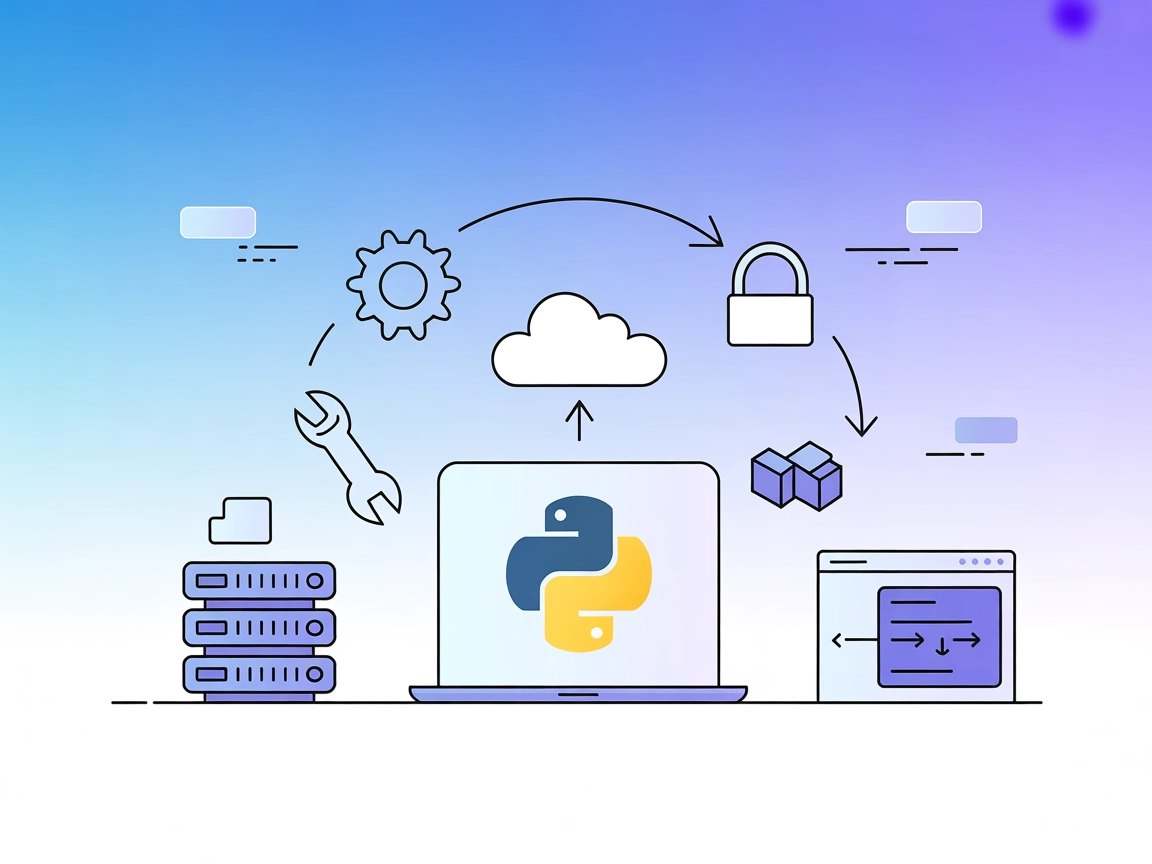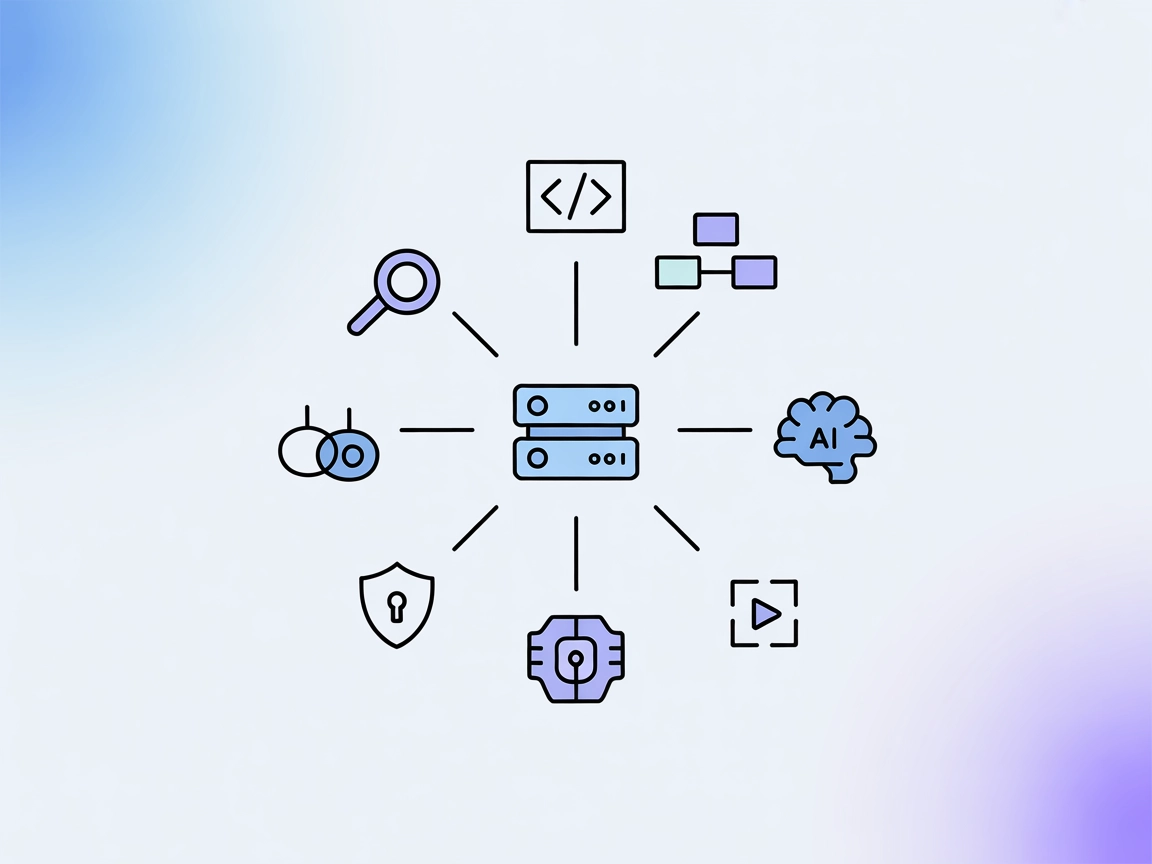
MCP Code Executor MCP Server
The MCP Code Executor MCP Server enables FlowHunt and other LLM-driven tools to securely execute Python code in isolated environments, manage dependencies, and ...

Enable secure, automated, and parallel Python code execution within your AI workflows using FlowHunt’s pydanticpydantic-aimcp-run-python MCP Server.
FlowHunt provides an additional security layer between your internal systems and AI tools, giving you granular control over which tools are accessible from your MCP servers. MCP servers hosted in our infrastructure can be seamlessly integrated with FlowHunt's chatbot as well as popular AI platforms like ChatGPT, Claude, and various AI editors.
The pydanticpydantic-aimcp-run-python MCP Server is designed to serve as a bridge between AI assistants and Python code execution environments. By exposing a secure and controlled interface for running Python scripts, this MCP Server enables AI clients to interact programmatically with Python functions, automate computation workflows, and retrieve results as part of broader development pipelines. This capability is particularly valuable for tasks like dynamic code evaluation, rapid prototyping, or integrating Python-based analysis within LLM-driven automation. The server empowers developers to streamline coding, debugging, and data processing by connecting their AI tools with live Python execution—while maintaining clear security and operational boundaries.
No prompt templates are mentioned in the repository files or documentation.
No specific resource primitives are mentioned in the available repository content.
functions namespace is present, but no explicit tools are defined within it according to the repo content.functions namespace and are capable of being executed concurrently. Useful for distributing workloads or batch processing within the MCP context.multi_tool_use.parallel capability to execute multiple Python functions concurrently, optimizing workflows that benefit from parallelism.mcpServers section:{
"mcpServers": {
"pydanticpydantic-aimcp-run-python": {
"command": "npx",
"args": [
"@pydanticpydantic-aimcp-run-python@latest",
"start"
]
}
}
}
{
"mcpServers": {
"pydanticpydantic-aimcp-run-python": {
"command": "npx",
"args": [
"@pydanticpydantic-aimcp-run-python@latest",
"start"
]
}
}
}
{
"mcpServers": {
"pydanticpydantic-aimcp-run-python": {
"command": "npx",
"args": [
"@pydanticpydantic-aimcp-run-python@latest",
"start"
]
}
}
}
{
"mcpServers": {
"pydanticpydantic-aimcp-run-python": {
"command": "npx",
"args": [
"@pydanticpydantic-aimcp-run-python@latest",
"start"
]
}
}
}
For security, define your API keys and secrets in environment variables, not directly in configuration files. Reference them using the env field and pass them as needed in the inputs section. Example:
{
"mcpServers": {
"pydanticpydantic-aimcp-run-python": {
"command": "npx",
"args": [
"@pydanticpydantic-aimcp-run-python@latest",
"start"
],
"env": {
"PYTHON_API_KEY": "${PYTHON_API_KEY}"
},
"inputs": {
"api_key": "${PYTHON_API_KEY}"
}
}
}
}
Using MCP in FlowHunt
To integrate MCP servers into your FlowHunt workflow, start by adding the MCP component to your flow and connecting it to your AI agent:

Click on the MCP component to open the configuration panel. In the system MCP configuration section, insert your MCP server details using this JSON format:
{
"pydanticpydantic-aimcp-run-python": {
"transport": "streamable_http",
"url": "https://yourmcpserver.example/pathtothemcp/url"
}
}
Once configured, the AI agent is now able to use this MCP as a tool with access to all its functions and capabilities. Remember to change “pydanticpydantic-aimcp-run-python” to whatever the actual name of your MCP server is and replace the URL with your own MCP server URL.
| Section | Availability | Details/Notes |
|---|---|---|
| Overview | ✅ | |
| List of Prompts | ⛔ | No prompt templates found |
| List of Resources | ⛔ | No resource primitives found |
| List of Tools | ✅ | multi_tool_use.parallel and functions namespace; none explicitly defined |
| Securing API Keys | ✅ | Example provided in setup section |
| Sampling Support (less important in evaluation) | ⛔ | Not mentioned |
Based on the available information, this MCP server provides basic Python execution and parallel tool orchestration, but lacks prompt templates, resource primitives, and explicit sampling or roots support. Its major strengths are straightforward integration and clear security recommendations. Improvements could be made by adding more tools, prompts, and documentation on advanced MCP features.
This MCP server is functionally useful for Python code execution and parallelism, but the lack of prompts, resources, and explicit advanced MCP features makes it more of a basic integration. The codebase is minimal, and documentation on nuanced capabilities is limited.
| Has a LICENSE | ⛔ (Not found in the repo root for this subproject) |
|---|---|
| Has at least one tool | ✅ (multi_tool_use.parallel) |
| Number of Forks | (Check on GitHub repo) |
| Number of Stars | (Check on GitHub repo) |
Overall, I would rate this MCP server a 4/10 for foundational utility but limited feature set and documentation.
It provides a secure interface for running Python scripts and functions from AI agents, enabling automation, live code evaluation, and parallel execution within AI-powered workflows.
It supports dynamic Python execution and includes a parallel execution tool (multi_tool_use.parallel) for running multiple Python functions concurrently.
Store sensitive credentials in environment variables and reference them in your MCP server configuration's 'env' and 'inputs' sections, rather than hardcoding them into config files.
Use cases include AI-driven Python scripting, automated data analysis, parallel task execution, integration with CI/CD pipelines, and providing a code sandbox for education or experimentation.
No prompt templates or specific resource primitives are defined for this MCP Server.
Add the MCP component to your flow, open its configuration, and insert the server details using the provided JSON format. Ensure the server URL and name match your deployment.
Streamline your AI automation with secure Python code execution, parallel task orchestration, and effortless integration. Experience live Python scripting in your flows!

The MCP Code Executor MCP Server enables FlowHunt and other LLM-driven tools to securely execute Python code in isolated environments, manage dependencies, and ...

The py-mcp-mssql MCP Server provides a secure and efficient bridge for AI agents to interact programmatically with Microsoft SQL Server databases via the Model ...

The CodeLogic MCP Server connects FlowHunt and AI programming assistants to CodeLogic’s detailed software dependency data, enabling advanced code analysis, visu...
Cookie Consent
We use cookies to enhance your browsing experience and analyze our traffic. See our privacy policy.